2017-2018学年七年级英语下册 形容词副词讲义 (新版)人教新目标版.doc
七年级英语下册第三单元讲义重点短语语法归纳及练习(新)人教新目标版
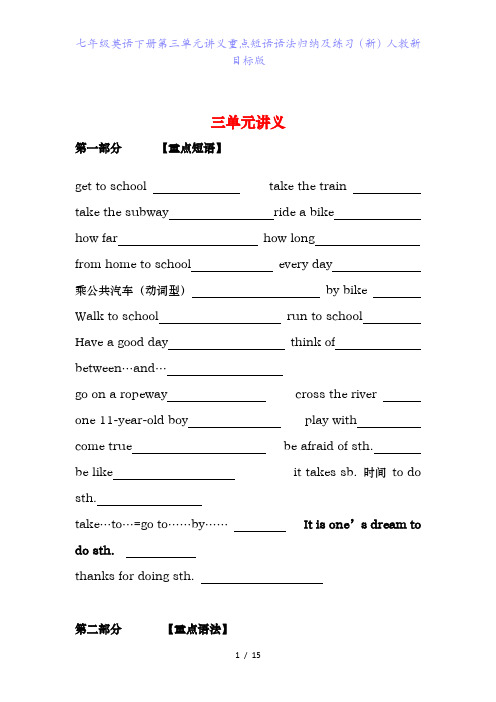
三单元讲义第一部分【重点短语】get to school take the traintake the subway ride a bikehow far how longfrom home to school every day乘公共汽车(动词型)by bikeWalk to school run to schoolHave a good day think of between…and…go on a ropeway cross the riverone 11-year-old boy play withcome true be afraid of sth.be like it takes sb. 时间to do sth.take…to…=go to……by…… It is one’s dream to do sth.thanks for doing sth.第二部分【重点语法】一、交通方式表达法1.动词型: take +限定词(a/an/the)+交通工具(单数)(take 译为乘坐,动词型通常放在句中)如:take a /the bus , take a/the subway, take a/the train 例:Tom takes a bus to school.翻译(Linda坐地铁去图书馆):Lindalibrary.◆有的交通工具不需要用take,如walk to/drive to /ride to/flyto/◆Walk to +地点=go to ...on foot走路去…如:I walk to school every day.=I go to school on foot.注意:如果后面接地点副词here , there , home 等介词to应省去2.介词型:1)by+交通工具(单数)(中间无任何修饰词,介词型通常位于句末)如:by bus/by subway/by train例:Tom goes to Beijing by train.2)in/on +限定词(a/an/the)+交通工具(单数)(位于句末,特别强调在自行车上用on)如:in a /the car, in a /the boat, in a/the taxiOn a /the bus, on a /the train, on a /the subway例:My father goes to work on a bus/in a car.注意:1.对交通工具提问用:how(怎样)如:My father goes to work on a bus(对划线部分提问)How does your father go to work?【试一试】1. I think you can _____to the new park. It’s a little far.A. by busB. take a busC. onfoot D. walk2. –-How does your brother usually go to school?–- ______car.A. ByB. InC. OnD. With3. I often go to school _____ my father’s car and go back home ______ foot.A. in; onB. by; byC. by; inD.on; by4. Jim often goes to school ______ bike. But today he goes to school ______ the school bus.A. on; byB. by; byC. by; onD. on; on二、交通方式之间的互换。
初中英语形容词和副词讲义
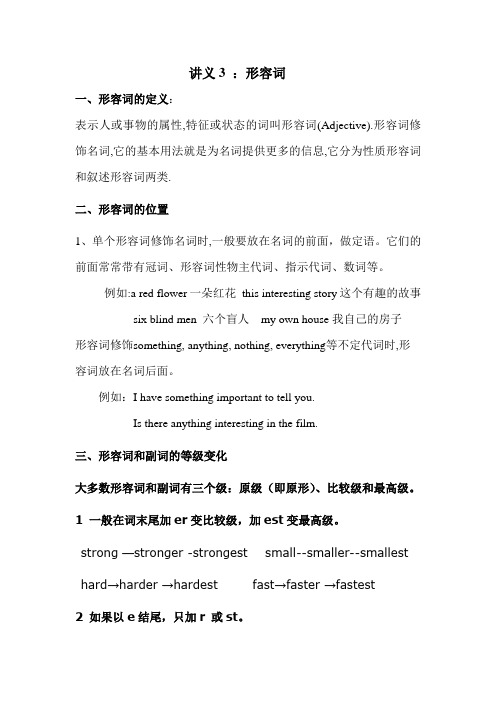
讲义3 :形容词一、形容词的定义:表示人或事物的属性,特征或状态的词叫形容词(Adjective).形容词修饰名词,它的基本用法就是为名词提供更多的信息,它分为性质形容词和叙述形容词两类.二、形容词的位置1、单个形容词修饰名词时,一般要放在名词的前面,做定语。
它们的前面常常带有冠词、形容词性物主代词、指示代词、数词等。
例如:a red flower一朵红花this interesting story这个有趣的故事six blind men 六个盲人my own house我自己的房子形容词修饰something, anything, nothing, everything等不定代词时,形容词放在名词后面。
例如:I have something important to tell you.Is there anything interesting in the film.三、形容词和副词的等级变化大多数形容词和副词有三个级:原级(即原形)、比较级和最高级。
1 一般在词末尾加er变比较级,加est变最高级。
strong —stronger -strongest small--smaller--smallest hard→harder →hardest fast→faster →fastest2 如果以e结尾,只加r 或st。
nice--nicer--nicest fine--finer--finest3 以重读闭音节,末尾只有一个辅音字母,须先双写这个辅音字母,再加er或est。
sad--sadder-- saddest big--bigger--biggest hot--hotter --hottest4 以辅音字母加y结尾的词,把y变成i,再加er或est。
angry--angrier-angriest early→earlier →earliest hungry-hungrier-hungriest5、但是,开放类副词即形容词加ly结尾变成的副词加more或most.如quickly →more quickly →most quickly quietly →more quietly →most quietlyslowly—more slowly—most slowly[注]:early中的ly不是后缀,故把y变i再加er和est6、大部分双音节和所有多音节词都在其前面加more变比较级,加most变最高级different -more different -most differentbeautiful--more beautiful--the most beautiful expensive--more expensive--the most expensive但是,以形容前缀un结尾的三音节形容词不适合上述情况,如unhappy,untidy,我们可以说:unhappier→unhappiest,形容词比较级和最高级的不规则变化四.形容词副词的用法1."the+形容词",表示一类人或事物,相当于名词,用作主语及宾语The old often think of old things.2 "The+形容词比较级..., the+形容词比较级..."表示" 越... 就越..."。
人教新目标英语语法专题研究专题七 形容词和副词课件(共49张PPT)

专题七 形容词和副词
第一节 练讲重难点
形容词和副词辨析
命题点一 形容词的用法及辨析 命题点二 副词的用法及辨析 命题点三 形容词和副词混合辨析 第二节 形容词和副词的比较等级 练讲重难点
第一节 形容词和副词辨析
【考情概览】分析云南近5年真题可以看出, 形容词和副词是每年中考的必考点。命题点 有:形容词词义辨析、副词词义辨析、形容 词副词混合辨析。设题主要是单项填空和完 形填空。形容词的词性转化以及形容词短语 在词语运用中考查。其中形容词词义辨析和 词性转化是每年考查的重点。
A and wait until I finish 2.You have to be _____ my work. A. patient B. strict C. honest D. active
3.He is _____ B the city because he has lived there for nearly twenty years. A. angry with C. famous as B. familiar with D. worried about
同形
构成 形容词后直接加ly
例词
(2015昆明72题;2014昆明67 sad-sadly; 题;2013云南68题;2012年2 次) polite-politely
辅音字母加y结尾的形容词改y happy-happily;
为i再加ly(2012昆明70题) angry-angrily
构成
例词
3. 形容词短语(2011年3次;2013年1次; 2012年6次) 形容词短语主要出现在单项填空题和汉译 英题中。以下为云南中考考查过的形容词短 语: ①be worried about对„„担心(2014昆明46 题) ②be crazy about对„„疯狂/着迷(2014昆明 46题)
人教版英语七年级下册第三单元形容词语法知识点总结

人教版英语七年级下册第三单元形容词语法知识点总结本文档总结了人教版英语七年级下册第三单元的形容词语法知识点。
1. 形容词的基本概念- 形容词是一种修饰名词或代词的词语,用来描述事物的特征、性质或状态。
- 形容词通常放在名词前面,用来限定名词的范围。
2. 形容词的基本用法- 形容词作定语- 形容词放在名词前面,用来修饰名词,增添形容词所描述的特征。
- 例如:a beautiful flower(一个美丽的花)- 形容词作表语- 形容词放在系动词后面,用来描述主语的特征。
- 例如:The weather is sunny.(天气晴朗。
)- 形容词作宾语补足语- 形容词放在及物动词的后面,用来补充说明宾语的特征。
- 例如:They found the book interesting.(他们发现这本书很有趣。
)3. 形容词的比较级和最高级- 形容词的比较级用于比较两个或多个事物的特征。
- 比较级的构成:原形 + er + than- 例如:taller than(比...更高)- 形容词的最高级用于比较三个或三个以上事物的特征。
- 最高级的构成:the + 原形 + est- 例如:the tallest(最高的)4. 形容词的位置- 形容词一般放在名词前面,但有时也可以放在名词后面。
- 当形容词修饰不可数名词或定物名词时,通常放在名词前面。
- 例如:a beautiful girl(一个美丽的女孩)- 当形容词修饰人或个体名词时,通常放在名词后面。
- 例如:a boy happy(一个快乐的男孩)以上是人教版英语七年级下册第三单元的形容词语法知识点总结。
希望对你有所帮助!。
新目标英语七年级下册讲义—Unit 11 How was your school trip

新目标七年级下册Unit 11 How was your school trip? 讲义一、重点单词k 挤奶2. cow .奶牛3. horse 马4. feed 喂养;饲养5. farmer 农民;农场主6. quite 相当;安全7. anything (常用于否定句或疑问句)任何东西;任何事物8. everything 一切;所有事物9. grow 种植;生长;发育10. farm 农场;务农;种田11. pick 采;摘12. excellent极好的;优秀的13. countryside 乡村;农村14. yesterday 昨天15. flower花16. worry 担心;担忧17. luckily 幸运地;好运地18. sun 太阳19. museum博物馆20. fire 火灾21. painting .油画;绘画22. exciting adj.使人兴奋的;令人激动的23. lovely可爱的24. expensive 昂贵的25. cheap 廉价的;便宜的26. slow缓慢的;迟缓的27. fast 快地(的)28. robot .机器人29. guide 导游;向导30. gift 礼物;赠品31. dark 黑暗的;昏暗的32. hear(heard)听到;听见自测表:二、短语归纳1.school trip 学校旅行2.go for a walk 去散步k a cow 给奶牛挤奶4.ride a horse 骑马5.feed chickens 喂鸡6.talk with 和......交谈7.take photos /a photo拍照st week上周9.ask some questions问一些问题10.quite a lot 相当多11.show sb. around sp.带某人参观某地12.learn about 了解13.grow strawberries种植草莓14.from...to... 从…到…15.pick some strawberries摘草莓16.take sth home带…回家17.climb the mountains 爬山18.visit my grandparents看望我的祖父母19.go fishing 去钓鱼20.so much 如此多的21.go to the zoo去动物园22.go to a farm去农场23a lot of fun很多乐趣24.play games 做游戏e out 出来26.go to the countryside去乡下27.science museum科学博物馆28.visit a museum 参观博物馆29.play chess with sb... 和…下棋30.buy sth for sb为某人买31.be interested in…对…感兴趣32.all in all总的来说33.not...at all 一点也不,根本不三、句型集萃1. How + be…? + like? ……怎么样?2. How do/does+主语+feel about...? 对......感觉如何?3. too many + 可数名词复数太多的……4.teach sb. how to do sth. 教某人怎样做某事5.quite + a / an + 形容词+可数名词单数= a + very + 形容词+可数名词单数一个相当/ 很……6.buy sth. for sb.=buy sb. Sth.为某人买东西7.It’s +形容词+to do sth. 做某事是......的8.sound+形容词听起来......四、词汇、句型讲解及拓展1.How was your school trip?学校旅行怎么样?【解析】How+be+主语?=What be+主语+like?意为“….怎么样?”★★★本句的答语:It was great./It was OK./It was/wasn’t good….【拓展】how是疑问副词,意为“怎么样,怎么”,用来构成特殊疑问句,主要用法如下:1)询问如何做某事,或者做某事方式。
人教版初中英语初中英语形容词和副词用法讲解
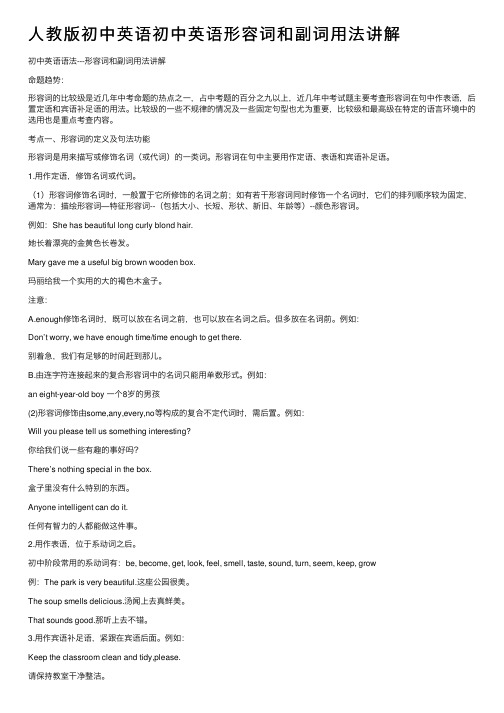
⼈教版初中英语初中英语形容词和副词⽤法讲解初中英语语法---形容词和副词⽤法讲解命题趋势:形容词的⽐较级是近⼏年中考命题的热点之⼀,占中考题的百分之九以上,近⼏年中考试题主要考查形容词在句中作表语,后置定语和宾语补⾜语的⽤法。
⽐较级的⼀些不规律的情况及⼀些固定句型也尤为重要,⽐较级和最⾼级在特定的语⾔环境中的选⽤也是重点考查内容。
考点⼀、形容词的定义及句法功能形容词是⽤来描写或修饰名词(或代词)的⼀类词。
形容词在句中主要⽤作定语、表语和宾语补⾜语。
1.⽤作定语,修饰名词或代词。
(1)形容词修饰名词时,⼀般置于它所修饰的名词之前;如有若⼲形容词同时修饰⼀个名词时,它们的排列顺序较为固定,通常为:描绘形容词—特征形容词--(包括⼤⼩、长短、形状、新旧、年龄等)--颜⾊形容词。
例如:She has beautiful long curly blond hair.她长着漂亮的⾦黄⾊长卷发。
Mary gave me a useful big brown wooden box.玛丽给我⼀个实⽤的⼤的褐⾊⽊盒⼦。
注意:A.enough修饰名词时,既可以放在名词之前,也可以放在名词之后。
但多放在名词前。
例如:Don’t worry, we have enough time/time enough to get there.别着急,我们有⾜够的时间赶到那⼉。
B.由连字符连接起来的复合形容词中的名词只能⽤单数形式。
例如:an eight-year-old boy ⼀个8岁的男孩(2)形容词修饰由some,any,every,no等构成的复合不定代词时,需后置。
例如:Will you please tell us something interesting?你给我们说⼀些有趣的事好吗?There’s nothing special in the box.盒⼦⾥没有什么特别的东西。
Anyone intelligent can do it.任何有智⼒的⼈都能做这件事。
中学英语形容词和副词ppt课件

本标准适用于已投入商业运行的火力 发电厂 纯凝式 汽轮发 电机组 和供热 汽轮发 电机组 的技术 经济指 标的统 计和评 价。燃 机机组 、余热 锅炉以 及联合 循环机 组可参 照本标 准执行 ,并增 补指标 。
2) 形容词作状语时, 可以看作是“being+ 形容词”结构或when, if, because等从句 的省略, 表示时间、方式、原因、伴随、 让步、条件等, 也可以表示对主语进行解 释, 说明主语是什么情况, 或进行强调, 其 逻辑主语必须与句子主语保持一致。如: Hungry and tired, he had to stop working. Ripe(=When they are ripe), the oranges taste sweet.
3) 某些描述感觉或心情的形容词: glad “高 兴的”; pleased “高兴的”; content “满 意的”; sorry “难过的”; upset “难过的” 等。如:
I am glad/pleased to hear that you are
offered a good job. 4) 其他表语形容词: certain “确认的”;
本标准适用于已投入商业运行的火力 发电厂 纯凝式 汽轮发 电机组 和供热 汽轮发 电机组 的技术 经济指 标的统 计和评 价。燃 机机组 、余热 锅炉以 及联合 循环机 组可参 照本标 准执行 ,并增 补指标 。
2) 以-able和-ible结尾的形容词可置于前有 形容词最高级或only等修饰词的名词之 后。如: Bruce is the best person available. That is the only solution possible.
初中英语形容词和副词课件[优质PPT]
![初中英语形容词和副词课件[优质PPT]](https://img.taocdn.com/s3/m/1696a6d45ef7ba0d4a733b45.png)
例题: 1. Sam
is
hungry,
he’d
like
to
eat
__C__delicious.
A. some
B. any
C. 2.
something Don’t worry.
TherDe .isso_m_C_e_wahbeoreut
your
illness.
A.serious something B. anything serious
5). A Students are required to take part
in the boat race. A. Ten strong young Chinese B. Ten Chinese strong young C. Chinese ten young strong D. Young strong ten Chinese
但是,以上情况并不绝对,例外的情况是常有的,况且以 上规则也不好记。下面再介绍几条原则性的东西,供参考: 1. 总体描述在前,具体描述在后; 2. 主观描述在前,客观描述在后; 3. 普遍性描述在前,特殊性描述在后; 4. 音节少的词在前,音节多的词在后; 5. 与所修饰的名词关系不紧密的在前,关系紧密的在后。 注:有时,两个互补的形容词修饰同一个名词或代词,强 调全部范围时,可用and / or连起来(如:old and young, long or short, male and female)放在名词或代词的后 面,并且名词与形容词之间常用逗号隔开。 Visitors, old and young,were delighted. 不管老少, 所有的参观者都很高兴。
答案点拨A. 几个形容词修饰一个名词,他们的排列顺 序是:年龄,形状,大小+颜色+来源+质地+用途+国家 +名词。
人教版新目标英语七年级下册:Un...

⼈教版新⽬标英语七年级下册:Un...教师辅导讲义教学内容新课知识◆短语归纳1. what time ⼏点2. go to school 去上学3. get up 起床4. take a shower 洗淋浴5. brush teeth 刷⽛6. get to 到达7. do homework 做家庭作业8. go to work 去上班9.go home 回家10. have/eat breakfast 吃早饭11. get dressed 穿上⾐服12.get home 到家13. either…or… 要么…要么… 14. go to bed 上床睡觉15.get dressed 穿上⾐服16.go to school 去上学17.radio station ⼴播电视台18. take a walk 散步19. lots of=a lot of 许多,⼤量20. at night 在晚上21. be late for=arrive late for 迟到22.go shopping 去购物23.go on 继续24.go back 返回25.go over 仔细检查25. go away 离开26. in the morning/ afternoon/ evening 在上午/下午/晚上◆⽤法集萃1. at + 具体时间点在⼏点(⼏分)2. eat breakfast/ lunch/dinner 吃早饭/午饭/晚饭3. thirty\half past +基数词……点半4. fifteen\a quarter to +基数词差⼀刻到……点5. take a/an +名词从事……活动6. from …to … 从……到……7. need to do sth 需要做某事◆典句必背1. —What time do you usually get up? 你⼀般什么时候起床?—I usually get up at six thirty. 我通常6:30分起床。
2018年人教版七年级下册英语讲义(完整版)

新目标英语七年级下册知识点总结Unit 1 Can you play the guitar ?1,情态动词 +V 原 can do= be able to do2, Play+ the+ 乐器+球类,棋类3, join 参加社团、组织、团体4, 4 个说的区别: say+内容Speak+语言Talk谈论talk about sth talk with sb talk to sbTell 告诉,讲述tell sb( not) to do sthTell stories/ jokes5, want= would like + (sb) to do sth6, 4 个也的区别: too 肯定句末(前面加逗号)Either 否定句末(前面加逗号)Also 行前 be 后As well 口语中(前面不加逗号)7, be good at+ V-ing=do well in擅长于be good for 对⋯有益( be bad for 对⋯有害)be good to 对⋯友好( good 可用friendly ,nice,kind 替换)be good with 和⋯相处好 =get on/ alongwell with8,特殊疑问句的构成:疑问词+ 一般疑问句9, How/ what about+V- ing⋯怎么样?(表建议)10,感官动词(look, sound, taste, smell, feel)+adj/ like11,选择疑问句:回答不能直接用 Yes 或者No ,要从中选择一个回答12,students wanted for school show( wanted 表示招募,含有被动意义)13,show sth to sb=show sb sth give sth tosb=give sb sth14,help sb (to)do sthHelp sb with sthWith sb ’ s help= with the help of sbHelp oneself to 随便享用15,be busy doing sth/ be busy with sth16,need to do sth17,be free= have time18,have friends= make friends19,call sb at + 电话号码20, on the weekend= on weekends21,English-speaking students 说英语的学生(带有连词符,有形容词性质)22, do kung fu 表演功夫Unit 2 What time do you go to school?1,问时间用 what time 或者 whenAt+ 钟点at 7 o’ clock at noon/at night (during/ in the day )On+ 具体某天、星期、特指的一天on April 1st on Sunday on a coldwinter morningIn +年、月、上午、下午、晚上2,时间读法:顺读法逆读法:分钟≤ 30 用 past fivepast eight( 8:05) half past eight( 8:30)分钟> 30用toa quarter to ten( 9:45)整点用⋯ o’ clock 7 o’ clock( 7:00)3,3 个穿的区别: wear 表状态,接服装、手套、眼镜、香水等Put on 表动作,接服装Dress 表动作,接sb/oneself get dressed穿衣3,感叹句: How+adj+ 主谓!How+adj+a/an +n 单+ 主谓!What+ a/an +adj+ n 单+ 主谓!What+ adj+ n 复 / 不可数 + 主谓!4, from ⋯ to ⋯5, be/ arrive late for6,频度副词(行前be 后)Always usually often sometimesseldom hardly never7,一段时间前面要用介词for for half anhour for five minutes8, eat/ have ⋯ for breakfast/ lunch/ dinner/supper9, either⋯or10, a lot of=lots of11,it is +adj+for sb +to do sth ( adj 修饰 todo sth)It is important for me to learn English.it is +adj+of sb +to do sth (adj 修饰 sb)It is kind/ friendly/ nice of you to help me.Unit 3 How do you get to school?1,疑问词How 如何(方式)how long多长(时间)答语常用“(For/about +)时间段”how far 多远(距离)答语常用“(It’ s)数词+miles/ meters/ kilometers”how often 多久一次(频率)答语常用“ Always/ often/ every day/ ⋯”或“次数 +时间”等表频率的状语How soon 多快,多久以后,常用在将来时中。
2017年新目标中考《形容词、副词》语法课件(共74张PPT)

4. The storybook is very _____. I'm very _____ in it. A. interesting, interested B. interested, interesting C. interest, interested D. interesting, interest (2015 贵州铜仁)
【中考链接】
1. This kind of plant is _____ seen in our city because it lives 4,500m above sea level and is hard to find. A. commonly C. seldom B. always D. easily (2015 江苏南京)
2. The final exam is very important. We must treat it _____. A. serious B. seriously C. careless D. carelessly (2015 广东)
3. It is a world of flowers in spring in Dongying. You can see flowers _____. A. here B. there C. somewhere D. everywhere (2015 山东东营)
七年级英语下册形容词副词讲义(新版)人教新目标版
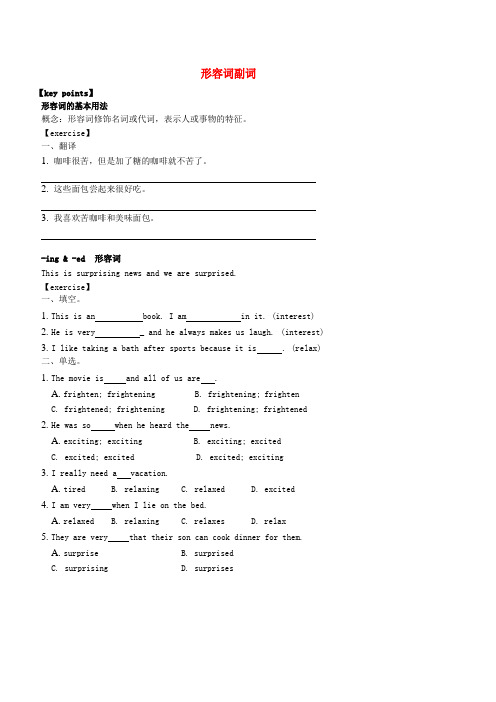
形容词副词【key points】形容词的基本用法概念:形容词修饰名词或代词,表示人或事物的特征。
【exercise】一、翻译1.咖啡很苦,但是加了糖的咖啡就不苦了。
2.这些面包尝起来很好吃。
3.我喜欢苦咖啡和美味面包。
-ing & -ed 形容词This is surprising news and we are surprised.【exercise】一、填空。
1.This is an book. I am in it. (interest)2.He is very _ and he always makes us laugh. (interest)3.I like taking a bath after sports because it is . (relax)二、单选。
1.The movie is and all of us are .A.frighten; frighteningB. frightening; frightenC. frightened; frighteningD. frightening; frightened2.He was so when he heard the news.A.exciting; excitingB. exciting; excitedC. excited; excitedD. excited; exciting3.I really need a vacation.A.tiredB. relaxingC. relaxedD. excited4.I am very when I lie on the bed.A.relaxedB. relaxingC. relaxesD. relax5.They are very that their son can cook dinner for them.A.surpriseB. surprisedC. surprisingD. surprises复合形容词由两个或以上的单词组成,可修饰名词,中间有连字符【exercise】一、单选1.There is a boy in the boat.A.three years oldB. three-years-oldC. three-year-oldD. three year old2.He is and he has an brother.A.ten-year-old; eight years oldB.ten years old; eight-year-oldC.ten year old; eight-years-oldD.ten year old; eight year old3.We’ll have a holiday. What about going to Shaolin Temple?A.two daysB. two-dayC. two-day’sD. two-days4.This Chinese book is .A.25 centimeter wideB. 25 centimeters wideC. wide 25 centimeterD. 25 wide centimeters5.David’s little sister is only eight .A.months oldB. month oldC. year’s oldD. year old6.The little girl wrote a letter to her aunt.A.five-hundred-wordsB. five-hundred-wordC. five-hundreds-wordD. five-hundreds-words当形容词遇上复合不定代词复合不定代词:由some-, any-, no-, every-加上-one, -body, -thing 组成复合不定代词 +形容词【exercise】一、单选。
人教版英语七年级下册所有形容词

在这篇文章中,我将深入探讨人教版英语七年级下册所有形容词的内容,并且会按照从简到繁的方式进行分析和介绍。
我会列举出所有形容词的基本词汇和用法,然后会逐一进行深入解释和举例说明。
在全文的总结部分,我会对这些形容词的特点和用法进行回顾性的概括,同时共享我个人对这些形容词的理解和看法。
1. 形容词的基本概念在学习英语的过程中,形容词是一类非常重要的词性,它用来描述名词的属性和特征。
在人教版英语七年级下册中,我们学习了很多形容词,这些形容词在日常生活和阅读理解中都起到了非常重要的作用。
比如:happy, sad, big, small, tall, short等等。
它们可以帮助我们更准确地描述人和事物的外貌和性质。
2. 形容词的用法与例子接下来,我将逐一介绍人教版英语七年级下册中出现的所有形容词,并给出相应的用法和例子。
我们会学习到一些描述人的外貌和性格特征的形容词,还会学习到一些描述事物大小、颜色和状态的形容词等等。
通过这些例子,我们可以更加深入地理解这些形容词的意义和用法。
3. 总结与个人观点在全文的总结部分,我会对这些形容词的特点和用法进行回顾性的总结。
我会共享我个人对这些形容词的理解和看法。
我认为,形容词是非常有趣和丰富的词性,它可以帮助我们更生动地描绘周围的世界,丰富我们的语言表达能力。
通过这样的分析和介绍,相信你对人教版英语七年级下册所有形容词都会有一个更全面、深刻和灵活的理解。
希望我的文章能够帮助你更好地掌握这些形容词的用法,提高你的英语写作和表达能力。
形容词的基本概念形容词是英语中的一类词性,用来描述名词的特征、性质或状态。
在人教版英语七年级下册中,我们学习了许多形容词,这些词汇丰富了我们的词汇量,帮助我们更准确地描述人和事物。
我们学习了一些描述人的外貌和性格特征的形容词,比如tall (高的), short (矮的), handsome (英俊的), beautiful (美丽的), friendly (友好的), funny (有趣的)等等。
【精编】2017-2018学年七年级英语下册 代词拔高课讲义 新人教新目标版.doc
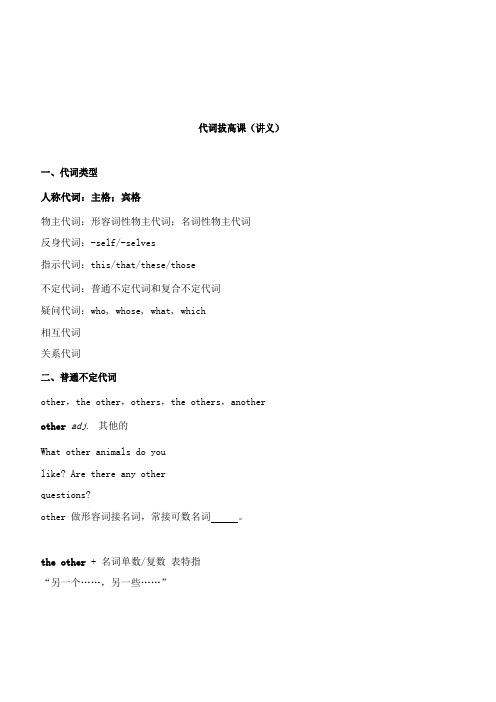
代词拔高课(讲义)一、代词类型人称代词:主格;宾格物主代词:形容词性物主代词;名词性物主代词反身代词:-self/-selves指示代词:this/that/these/those不定代词:普通不定代词和复合不定代词疑问代词:who, whose, what, which相互代词关系代词二、普通不定代词other,the other,others,the others,another other adj. 其他的What other animals do youlike? Are there any otherquestions?other 做形容词接名词,常接可数名词。
the other + 名词单数/复数表特指“另一个……,另一些……”On weekends I do all my housework on one day so the otherday I’m free to relax.I know one of the dancers but who’s the other one?The museum may be closed but the other tourist places are open.other pron.She is driving with one hand and eating the hamburger withthe other. I have two favorite singers. One is Zhang Jie,the other is Jay Chou. the other “(两者中的)另一个”,可单独使用常用句型:one…the other…one… the other + n.others pron. 其他的人或物,单独使用Some of these pictures are better than others.These wine glasses are broken but the others are alright.the others 表特指,“剩余(的全部)”,单独使用My friends joined two clubs. Some joined the swimming club andjoined the art club.another 又一,另一,再一determiner 修饰名词,接可数名词单数Would you like anotherapple? We need anothercomputer.The room is too small. Let’s see if they have another one.pron. 单独使用I don’t like this book. I am going to ask for another.总结可用作形容词修饰名词的:other,接可数名词复数another,接可数名词单数the other,接可数名词单数或者复数可用作代词单独使用的:the other,another 另一个人或物others,the others 其他的人或物练习:( )We have two foreign teachers here. One is from England, and is from America.A.anotherB. the otherC. otherD. the others( ) Some people like to rest in their free time. like to travel.A. OtherB. The othersC. OthersD. Another( )This cake is delicious! Can I have piece, please?A. otherB. anotherC. othersD. theother ( )Where areboys?A. the otherB. the othersC. othersD. another三、复合不定代词anyone (anybody)1.任何人,随便哪个人The exercises are so simple that almost anyone can do them.2.用于否定句和疑问句中,和 someone 的区别与 any,some 的区别相同Is anyone here?There isn’t anybody in the classroom.3.& everyone: all peopleThe police questioned everyone in the room.Everything in the shop is so good that I want to buy all of them. —What would you like to eat? —Anything is OK.注意:复合不定代词做主语,谓语动词用单数。
人教版初一下英语形容词专题讲解(共33张PPT)
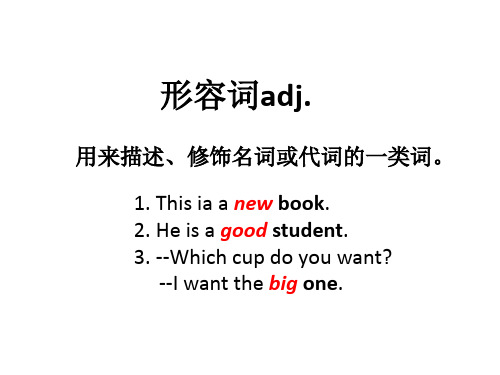
I have ever read.
The red apple is as sweet as the green apple.
The boy is as old as the girl.
old
The blue car is as clean as the red car.
clean
同级比较:as…as (像……一样)
A. hot
B. too hot
C. the hottest
D. hotter
3. She is a careful(细心的) girl. She is the
___B___in her class.
A. more careful
B. most careful
C. the most careful
Test (小测)
5.不规则变化
good-better-best many-more-most bad-worse-worst
不规则变化表
原级
比较级
最高级
good (好的), well (身健康的) bad(坏的), ill(不健康的)
many, much
( 许多的)
better worse more
best worst most
tall-taller-tallest cold-colder-coldest cool-cooler-coolest old-older-oldest .
2.以不发音e结尾,+r/st.
large-larger-largest nice-nicer-nicest late-later-latest .
This book is interesting.
2018中考英语总复习第二部分语法专题(六)形容词和副词课件人教新目标版英语课件PPT

专题(六) 形容词和副词
2.多个形容词修饰同一个名词的顺序 限定词(冠词、指示代词、形容词性物主代词、数词)→描绘 性形容词(大小、长短、形状、长幼、新旧、颜色、国籍、材 料)→名词。 a famous American medical college 一所著名的美国医学院 3.形容词的常用句式 (1)“It's+adj.+of+sb.+不定式.”表示“某人做某事是 ……的”。 【注意】 在这一句型中,常用描述行为者的性格、品质的 形容词,如good, kind, nice, polite, clever, foolish, lazy, careful, careless, right, wrong等。
考点直击
专题(六) 形容词和副词
This classroom is _n_o_t_a_s_/_s_o_b_i_g_a_s___ that one. 这间教室不如那间大。 He doesn't walk as slowly as you. 他走得不如你走得慢。 2.比较级常用的句型结构 (1)“A+be/v.+比较级+than+any other+可数名词单数(+ 介词短语)”表示“A比同一范围内的其他任何一个人/物都 ……”,含义是“A最……”。 Xiaoming is taller than _a_n_y_o_t_h_e_r_b_o_y_ in his class.= Xiaoming is taller than (any of) the other boys in his class. 小 明比他班上的其他任何男孩都高。 =Xiaoming is the tallest boy in his class. 小明是他班上最高的男孩。
。 T_h_e_h__a_rd__er__ you work,th_e__b_e_tt_e_r___ your grades will be. 你学习越努力,你的成绩就会越好。
人教版英语七年级下册期末综合复习 学案 --形容词,副词
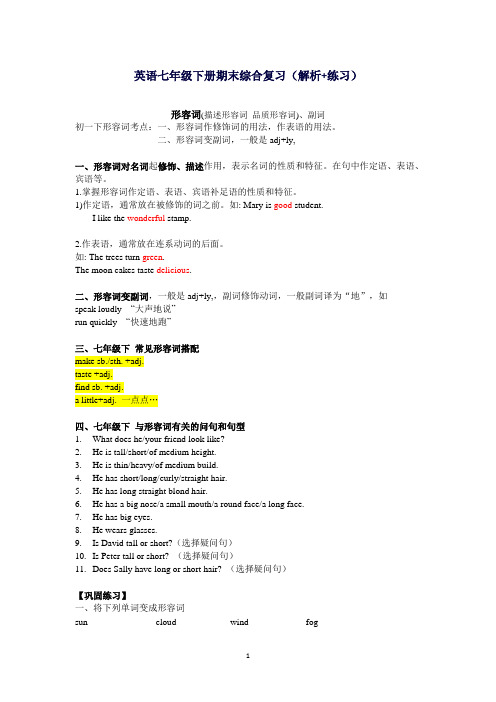
英语七年级下册期末综合复习(解析+练习)形容词(描述形容词品质形容词)、副词初一下形容词考点:一、形容词作修饰词的用法,作表语的用法。
二、形容词变副词,一般是adj+ly,一、形容词对名词起修饰、描述作用,表示名词的性质和特征。
在句中作定语、表语、宾语等。
1.掌握形容词作定语、表语、宾语补足语的性质和特征。
1)作定语,通常放在被修饰的词之前。
如: Mary is good student.I like the wonderful stamp.2.作表语,通常放在连系动词的后面。
如: The trees turn green.The moon cakes taste delicious.二、形容词变副词,一般是adj+ly,,副词修饰动词,一般副词译为“地”,如speak loudly “大声地说”run quickly “快速地跑”三、七年级下常见形容词搭配make sb./sth. +adj.taste +adj.find sb. +adj.a little+adj. 一点点…四、七年级下与形容词有关的问句和句型1.What does he/your friend look like?2.He is tall/short/of medium height.3.He is thin/heavy/of medium build.4.He has short/long/curly/straight hair.5.He has long straight blond hair.6.He has a big nose/a small mouth/a round face/a long face.7.He has big eyes.8.He wears glasses.9.Is David tall or short?(选择疑问句)10.Is Peter tall or short? (选择疑问句)11.Does Sally have long or short hair? (选择疑问句)【巩固练习】一、将下列单词变成形容词sun________ cloud________ wind_________ fog__________rain_______ snow________ health________ beauty_______care_______ help________ forget________ use__________difference_______ friend_______ fool_________ danger__________quickly_________ clearly_______ usually__________ slowly_________really__________ truly__________ enjoy_________ interest_________二、将下列单词变成合适形式的形容词形容事/物形容人surprise _____________ ( 令人惊讶的的) ______________(感到惊讶的) excite _____________ ( 令人兴奋的) ______________(感到兴奋的) interest _____________ ( 令人感兴趣的) _______________(感兴趣的)worry _____________ ( 令人担忧的) ______________(感到担忧的)bore _____________(令人无聊的、枯燥的) ______________(感到厌烦的)relax _____________ ( 令人轻松的) ______________(感到轻松的)amaze(使人吃惊), annoy(打扰), disappoint(使失望), embarrass(使窘迫), frustrate (使沮丧), tire等也可以这样变。
- 1、下载文档前请自行甄别文档内容的完整性,平台不提供额外的编辑、内容补充、找答案等附加服务。
- 2、"仅部分预览"的文档,不可在线预览部分如存在完整性等问题,可反馈申请退款(可完整预览的文档不适用该条件!)。
- 3、如文档侵犯您的权益,请联系客服反馈,我们会尽快为您处理(人工客服工作时间:9:00-18:30)。
形容词副词【key points】形容词的基本用法概念:形容词修饰名词或代词,表示人或事物的特征。
【exercise】一、翻译1.咖啡很苦,但是加了糖的咖啡就不苦了。
2.这些面包尝起来很好吃。
3.我喜欢苦咖啡和美味面包。
-ing & -ed 形容词This is surprising news and we are surprised.【exercise】一、填空。
1.This is an book. I am in it. (interest)2.He is very _ and he always makes us laugh. (interest)3.I like taking a bath after sports because it is . (relax)二、单选。
1.The movie is and all of us are .A.frighten; frighteningB. frightening; frightenC. frightened; frighteningD. frightening; frightened2.He was so when he heard the news.A.exciting; excitingB. exciting; excitedC. excited; excitedD. excited; exciting3.I really need a vacation.A.tiredB. relaxingC. relaxedD. excited4.I am very when I lie on the bed.A.relaxedB. relaxingC. relaxesD. relax5.They are very that their son can cook dinner for them.A.surpriseB. surprisedC. surprisingD. surprises复合形容词由两个或以上的单词组成,可修饰名词,中间有连字符【exercise】一、单选1.There is a boy in the boat.A.three years oldB. three-years-oldC. three-year-oldD. three year old2.He is and he has an brother.A.ten-year-old; eight years oldB.ten years old; eight-year-oldC.ten year old; eight-years-oldD.ten year old; eight year old3.We’ll have a holiday. What about going to Shaolin Temple?A.two daysB. two-dayC. two-day’sD. two-days4.This Chinese book is .A.25 centimeter wideB. 25 centimeters wideC. wide 25 centimeterD. 25 wide centimeters5.David’s little sister is only eight .A.months oldB. month oldC. year’s oldD. year old6.The little girl wrote a letter to her aunt.A.five-hundred-wordsB. five-hundred-wordC. five-hundreds-wordD. five-hundreds-words当形容词遇上复合不定代词复合不定代词:由some-, any-, no-, every-加上-one, -body, -thing 组成复合不定代词 + 形容词【exercise】一、单选。
1.Tom came in and said he had to tell the class.A.anything importantB. important everythingC. something importantD. important something2.—Your coffee, please.—There must be in the coffee. I like this kind of coffee with sugar.A.nothing sweetB. something sweetC. sweet somethingD. sweet nothing3.Is there with your bike?A.wrong somethingB. wrong anythingC. something wrongD. anything wrong4.—Would you like to drink?—Yes, I’d like a cup of coffee.A.something elseB. else somethingC. anything elseD. else anything5.—Could you please tell me in today’s newspaper?—Sorry, .A.something special; special nothingB.special something; special nothingC.something special; nothing specialD.special something; nothing special副词的基本用法概念:用以修饰动词、形容词或其他副词的词。
【exercise】翻译1.教室里很安静,大家正在安静地学习。
2. Lucy 是个快乐的女孩,她总是开心地笑。
【综合练习】一、填空。
1.You should be in the exam. (care)2.You should do your homework . (care)3.Allan did the exercises too (粗心) , and it made his teacher very angry.4.We eat food. (health)5.A baby is crying . (loud)6.Listen! The lovely birds are singing nicely and (soft).7.Look at the little dog. It’s playing with the (friend) little cat.二、单选。
1.Nancy looked very when she heard the bad news.A.happyB. happilyC. sadD. sadly2.Is this a photo of your sister? She looks in the pink dress!A.lovelyB. quietlyC. politelyD. happily3.It suddenly began to rain .A.hardlyB. heavilyC. heavyD. away4.Jim said he would go , but then he drove very fast.A.earlyB. quicklyC. directlyD. slowly5.Her are very _ to us. We all like them.A.friendly; friendlyB.friends; friendlyC.friend; friendlyD.friendly; friendsgood & well 辨析good adj. 好的well adv. 好地; adj. 身体好; n. 井【exercise】一、单选。
1.My little sister sings _ .A.niceB. wellC. goodD. very good2.Lin Shuhao is a basketball star. Heplays basketball .A.good; niceB. good; wellC. well; goodD. well; well3.—Would you like to have dinner with me?—That sounds . I’m hungry now.A.badB. wellC. goodD. boring4.This kind of dress looks and sells .A.good ; wellB. well; niceC. good; goodD. well; well5.Kim is at English in our class, and Lily does in it, too.A.well; goodB. good; wellC. good; goodD. well; wellhard & hardly 辨析hard adj. 困难的;硬的;adv. 努力地hardly adv. 几乎不【exercise】一、单选。
1.She thought , then she had an good idea.A.hardB. hardlyC. veryD. quite2.—Does Adam always finish his homework on time?—Yes, of course. He _ leaves today’s work for tomorrow.A.alsoB. hardlyC. onlyD. usually3.Tom worked very _before the English exam because hespent time remembering words these months.A.hard; hardB. hardly; hardlyC. hardly; hardD. hard; hardly4.Though he has studied at Russian for ten months, he can stillspeak the language.A.hard; hardB. hardly; hardlyC. hard; hardlyD. hardly; hard讲义参考答案形容词的基本用法翻译:1.Coffee is bitter, but it isn’t bitter withsugar. 2.These bread tastes delicious.3.I like bitter coffee and delicious bread.-ing & -ed 形容词一、填空。
